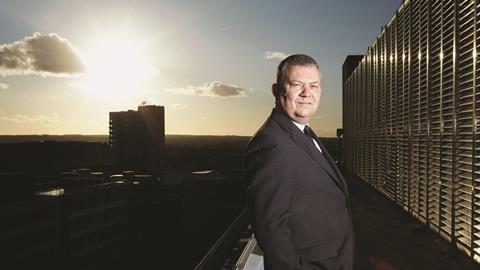How should the UKās largest independent consultant respond to the āevil Empireā of consolidated corporations taking over the market? Mott MacDonald chairman Keith Howells tells ŠŌ°ÉµēĢØ about the companyās plans to strike back. Tom Campbell photography
āItās a bit like Star Wars really,ā jokes Keith Howells, chairman of global engineer Mott MacDonald. āThe rebels ganging together against the evil Empire.ā
Heās talking about the ānuclear arms raceā happening in the consultancy sector - the trend towards consolidation among firms and the growth of the supersized consultant.
The ārebelsā in Howellsā analogy are independent, employee-owned consultants such as his own. The āevil Empireā consists of the large listed corporates that Howells claims are close to crowding out the market.
The 58-year-old clearly does not want for fighting spirit - Mott MacDonald was embroiled in the UK construction industryās biggest ever law suit over its work on Multiplexās Wembley stadium before settling out of court (see box, overleaf). But behind his āevil Empireā joke is a serious dilemma - should the second biggest consultant in the UK merge to compete with the listed giants? Or is it happy to stay independent?
Howells admits the firm will āprobablyā explore merger options within the next 10 years. Before that, however, it is returning to a strategy that has served it well over the past decade: expansion. āItās always been business folklore that you donāt want to be in the middle,ā says Howells, sitting in his ninth-floor office in Croydon. āThe issue is whether we end up in the middle as others stretch away.ā
Keeping up with the Harrises
It may seem surprising that Howells is mulling over the need to significantly gear up Ā£1bn-turnover Mott MacDonald again, so soon after a five-year period in which it doubled turnover through major expansion. Between 2004 and 2009 - when Howells, who has spent his entire 36-year career at the company, was managing director - it grew from Ā£485m to just over Ā£1bn. There were no fewer than 20 acquisitions - eight of which were in the US, including Hatch Atlantic Infrastructure, Higgins Associates and Rail Technologies. The companyās rate of growth has slowed since then - to 3% in 2010 and 2011 - but Howells is proud the firm is āstill growing ā¦ there are many who are notā.
āIf youāre not growing, youāre either standing still or shrinking, and neither is very comfortable,ā he says. āIf youāre growing, youāre creating opportunities for people, and in theory you should be improving the business and making it more profitable.ā
The strategy now is to expand by a further 3-5% over the next two years and faster thereafter, by increasing its presence, including acquisitions, in āresource-drivenā economies, such as Australia, Canada and Brazil, where oil and gas and mining add another dimension to the sorts of opportunities available.
āIn the UK weāre big - fine, weāre up there,ā Howells says. āBut in the globe weāre 15th. Thatās fine, but if we were to drop down to 30th or 40th because we were overtaken by lots of other people - that would probably be uncomfortable.ā
You can understand why Howells is wary. The last couple of years have seen some mega mergers in the consultants sector, with Scott Wilson, EC Harris and Davis Langdon all getting snapped up by overseas-based listed consultants - URS, Arcadis and Aecom respectively. Halcrow was also bought last September, but by a fellow employee-owned engineer, US-based CH2M Hill.
Howells doesnāt see any reason for this trend to end. āI ask myself the question, why would it stop? And there isnāt a good answer to that. Because the big companies are sitting on cash and theyāve got nothing else to do with it and they seem prepared to pay over the odds for small companies. Small companies are feeling a bit fragile so theyāre worried about scale and opportunities so itās quite easy for a big guy to come along and say, āCome and join me, youāll be secureā. The only way itās going to stop is if thereās a strong economic recovery and those small guys start feeling comfortable again and ask, āWhy should I sell my business?āā
It is these market dynamics that have led Howells to consider a merger within the next decade. āThe most likely thing for us would be to find an employee-owned company of similar size or smaller and merge with them,ā he explains. ā[But] youāve got to find a willing partner and thatās not always easy.ā
Merging may be on the cards but Howells draws a distinction between Mott MacDonald and its listed rivals. He has clear disdain for the notion of listing - the firm has āno intentionā of doing so, he says. āWe donāt have any external shareholders poking their noses in the business - who know nothing,ā he says. āIt gives us a lot of freedom to manage our own destiny.ā
The big hole
Mergers arenāt the only issue on Howellsā agenda. Heās conscious that thereās a sizeable gap in Mott MacDonaldās global network of 186 locations. āThe big hole for us is South America,ā he says. He explains it has always been on his list, but now, having set up bases in South Africa, Australia and Russia over the last five
years, the region is firmly in his sights. He visited Brazil on a reconnaissance trip last autumn and says the firm is considering setting up a permanent base there for the rest of South America.
The only hitch could be the potentially high cost of entry. āYou canāt do an organic start-up in Brazil - itās almost impossible. If you want to get anywhere in a reasonable timeframe you need to buy something, and right now companies are realising that the world fancies a bit of Brazil and theyāre asking a lot of money. It would be an expensive buy if we wanted to do it.ā
Howells expects the resource-driven economies to provide the best growth opportunities over the next few years, and says the firm is targeting infrastructure work linked to the global mining boom. āMining companies are having to do more of the infrastructure themselves as mines become more remote. Weāre very interested in doing more in the mining infrastructure sector.ā
He also sees potential for the firm in Iraq. Mott MacDonald was āpretty much there when the war ended [in 2003], getting water and power up and runningā, and has been in the country ever since - latterly working on projects for oil companies including Shell, BP and Exxon. He believes Iraq could be āthe biggest construction project in the world at some point in the next 10 years, providing it can get over its political issuesā.
The company is also āwatchingā Libya, after attending a trade mission to the country in January. Howells admits the firm was āluckyā its staff avoided serious harm in the country last year, after it pulled 10 workers out just a day before the violent uprising began.
Thereās a limit to how long you can do that job and remain sane. I donāt think I could have done it for much longer
Despite Howellsā bullish projections for some of its developing markets, he says North America is still the firmās ābest marketā, with Canada providing the strongest profit margins in the group. āCanada is stronger than the US and it has been for five years,ā he says. āItās ridden the recession well and thereās a lot going on, but it could be that weāre close to maxing out there.ā
Closer to home
The UK, on the other hand, is the firmās āsoftest marketā. Howells criticises the coalition government for its lack of clarity on energy policies, and claims the industry has ālost trustā in the coalition after its decision to slash solar feed-in tariffs. āIn principle it was right to peg back [the feed-in tariff], but they shouldnāt have done it in one foul swoop [sic] - we should have pegged it back more slowly over 10 years. There were smarter ways of doing it.ā
But Howells backs the governmentās mandatory BIM roll-out and believes the collaborative system is a āgame changerā for construction. āIf youāre not doing BIM in five yearsā time, you wonāt be in business,ā he says. The firm is already starting to see āquite substantial savingsā on BIM projects around the world, he adds.
Five years is a long time in business, of course, and nobody knows that better than Howells. He became managing director in 2004 and the next five years was a frenetic period. He says he doesnāt miss his former role. āThereās a limit to how long you can do it and remain sane. I donāt think I could have done it for much longer. When you come into a job like that, you feel you can make a difference, but after about five years youāve run out of ideas and itās time to let someone else have a go.ā
Of course, Howellsā period as managing director has left a strong legacy - it wasnāt just turnover that doubled, but also staff. āRecruitment became a key activity. We had a dozen recruiters in the business doing nothing else but recruitment.ā Mott MacDonald now employs 14,000 people - a far cry from the company of 80 he joined from university. And that sounds like a sizeable rebel force with which to battle it out against the evil Empire ā¦

The Wembley Row: āThe costs of going to court were excessiveā
It may be 18 months on from Mott MacDonaldās settlement with Multiplex on the largest ever UK construction law suit - a Ā£235m claim against the engineer for alleged delays on Wembley stadium - but Howellsā is clearly bruised by the experience. He confirms the two firms settled ābecause the costs of going to court were excessiveā, adding that the legal fees were āwell in excessā of the eventual settlement.
He says that in hindsight the firm should not have agreed to a restrictive ānovation clauseā with the client, Wembley National Stadium Ltd, which obliged them to transfer to the job and work with whoever was appointed contractor. He says: āIt would have been nice to have a get-out clause.ā
Company factfile: Mott MacDonald
- Employees: 14,000
- Sectors: All
- Offices: 37 in the UK, 186 worldwide
- Latest Financial information: Turnover 1bn (2010) Pre-tax profit 49.3m (2010)
- Position in Top 200 consultants: 2 (2011)
- Markets: Europe, North America, Asia, Africa and Australasia
- People: Chief executive: Richard Williams; Chairman: Keith Howells
























No comments yet